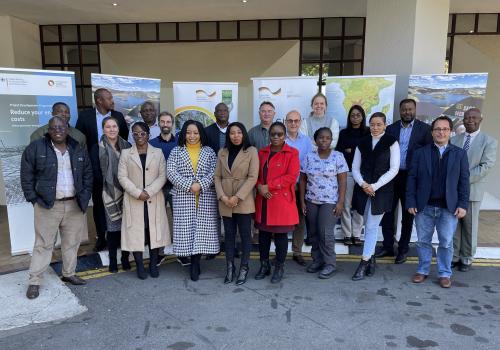The Global Initiative on Disaster Risk Management (GIDRM) in collaboration with the (Gesellschaft für Internationale Zusammenarbeit (GIZ) and the Southern African Development Community (SADC), convened the kick-off workshop on the “Enabling Environment for Risk-informed Development (EE4RID) within the GIZ/SADC - NEXUS Cluster Climate-Energy-Natural Resources from the 4-6 June 2024 in Gaborone, Botswana.
Risk-informed development prioritises the risks faced by communities living in the most vulnerable situations, whereby the communities most at risk come up with development solutions that mitigate their risks and their build resilience.
Commissioned by the German Federal Ministry for Economic Cooperation and Development (BMZ) and implemented by the GIZ, the GIDRM aims to strengthen the application of disaster risk management (DRM) approaches as integrated solutions in selected development cooperation projects and their partner structures in the SADC region, Pakistan, Georgia, and Colombia. Experiences and lessons learned from the integration process will be used to inform future portfolio development to better take risks into account and safeguard development gains.
The workshop focused on the core topic "Conserving nature and natural resources, protecting life on Earth" specifically on the sectors biodiversity, forests, water, renewable energy, and energy efficiency, the GIDRM recognises the intricate connections between the water, food, and energy sectors as reflected in the SADC Regional Water, Energy and Food (WEF) Nexus Framework and GIZ NEXUS Cluster Climate-Energy-Natural Resources.
According to the United Nation Office for Disaster Risk Reduction Global Assessment Report (UNDRR, 2022) climate and disaster risks are increasing worldwide and pose major challenges for many countries in view of the extreme disaster’s events, a trend expected to grow by 40% by the year 2030. This does not only threaten and take human lives but also destroy livelihoods, lead to destruction of ecosystems and undermine development successes. New and innovative approaches are crucial in offsetting the existing disaster risks and creation of new threats by developments. One of such approaches is theEE4RID framework”, which is a risk governance breakdown that includes alignment in policy regulation, organisational, procedural, and cultural dimensions, towards institutionalising risk-informed development (RID) into policy, planning and budgeting process in specific sectors and contexts.
Through the assessment and prioritisation of systemic risks, and the identification of sectorial entry points for RID planning and decision-making, the EE4RID puts forward the rationale that disaster risk governance does not only concern exposure and vulnerability to existing hazards but also recognises that every development decision-making process has a potential to promote resilient and sustainable development but also the creation of new or additional risks. To minimise risk creation and foster resilience of people and infrastructure, stakeholders across all sectors need to be strengthened in their capacities to understand risks and apply approaches to integrate disaster and climate risks in decision-making processes.
The workshop was attended by GIZ advisors from the development cooperation projects such as Going Greener, Climate Resilience and Natural Resources Management, Transboundary Water Management, and Project Development Programme and over 26 officials representing 12 organisations from across Southern Africa.
It provided a platform to:
strengthen the use of DRM approaches in the GIZ/SADC - NEXUS Cluster Climate Energy-Natural Resources.
- focus the EE4RID framework on the interconnectedness of biodiversity, forests, water, renewable energy, and energy efficiency as provided by the NEXUS organisational setup.
identify entry points for application of risk-informed development measures.
define a common process within the Greater Mapungubwe Transfrontier Conservation Area (TFCA) and within the Limpopo River Basin (LIMCOM) along which the EE4RID framework can be further replicated and co-owned as a NEXUS approach by Going Greener, Climate Resilience and Natural Resources Management, Transboundary Water Management, Project Development Programme.
The workshop marked a milestone towards integrating systemic disaster risk governance into GIZ SADC Nexus Cluster Energy, Water, Climate and Natural Resources Management and by extension the Great Mapungubwe Transfortier Conservation Area (GMTFCA) stakeholders that will be undertaken through learning and exchange programme to strengthen capacities towards review of the GMTFCA Integrated Development Plan. The GMTFCA is one of the severely affected areas by the protracted drought currently impacting the southern Africa region, where GIZ partners have ongoing planning programmes in separate sectors that could be impacted by systemic risk and that would benefit from being risk informed.

